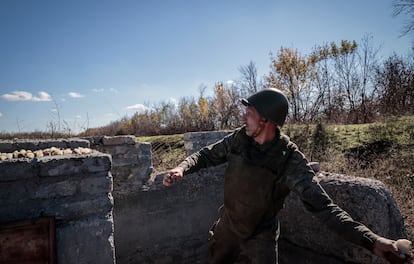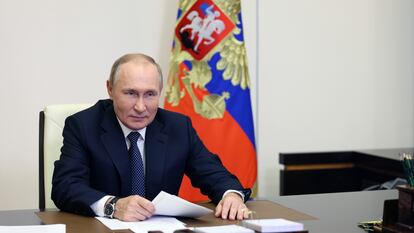Russian recruits blast chaotic mobilization and lack of pay
Thousands have fled the country to avoid being drafted for the war in Ukraine, although officials say over 70,000 volunteers have come forward


Same army, different pay. The chaotic mobilization decreed by Russian President Vladimir Putin two weeks ago to shore up his troops in Ukraine has further widened social differences in the country. A Kremlin spokesman admitted that some regions absolutely lack the means to support the families of new recruits, while the latter are “distressed” because they did not even have time to deal with personal paperwork before being sent away. Meanwhile, the Russian president is trying to contain the damage to his image caused by a mobilization that has already recruited around 200,000 men, according to the Kremlin, but also prompted thousands of Russians to flee the country. In a bid to allay citizen concern, Putin has announced a new exemption for students.

On Tuesday, the leader of a group of more than 50 new recruits from Omsk, already dressed for combat, declared before the cameras: “We are leaving our families at home. Some have children, wives on maternity leave. We ask ourselves the following question: Will they mobilize payments? Will they pay us? Our homes need it, the breadwinner is gone.”
“We don’t know what will happen there [in Ukraine], but we do know that other Russian regions will pay their men regularly” through local or regional aid, said this man, who was a civilian until a few days ago.
Средств на выплаты мобилизованным не хватает, признались в Омской области. Власти региона договорились с военкоматами, чтобы дать время мобилизованным на переоформление бизнеса (без уточнения, на кого), сообщает ТАСС. pic.twitter.com/w8HG1BE80n
— SOTA (@Sota_Vision) October 4, 2022
Recruits are especially worried about how their families will keep meeting mortgage payments. The government announced a moratorium on loans for mobilized men, but reality has collided with Russian bureaucracy: banks are demanding that conscripted men present the relevant papers in person, or else give a relative power-of-attorney. “I did not have time for that. The summons arrived in the afternoon and the next morning I had to be at the recruitment point,” adds the group leader.
Once mobilized, employment contracts are suspended and conscripts start receiving the same pay as professional soldiers participating in the war in Ukraine, 195,000 rubles a month (around $3,250), almost three times the average Russian salary, according to the state website Obyasniáyem. It is a hefty amount in Russia, but it also comes with enormous personal risk, which is why each region has tried to offer additional aid to reduce citizen anger at the call-up.
In the distant province of Sakhalin, bathed by the Sea of Japan, the parents of new recruits have received a crate of fish as way of compensation
“In Kemerovo they are paying 200,000 rubles as [additional] support. In Krasnoyarsk, 100,000 rubles. In Novosibirsk, Altai and Omsk we have not decided anything yet because of certain budget problems. It is clear that Moscow can pay a fighter 50,000 rubles more per month, but other regions do not have that kind of opportunity, “admitted the governor of Omsk, Alexander Búrkov, in an interview with local media.
In the distant province of Sakhalin, bathed by the Sea of Japan, the parents of new recruits have received a crate of fish as way of compensation, while in Moscow the mayor has signed a new order to provide jobs and daycare to the children of mobilized men. Putin’s spokesman, Dmitri Peskov, admitted on Wednesday that not all regions can afford to help their citizens. “There are many programs that place a great burden on regional budgets. Now there is another additional weight. Some have a [budgetary] buffer, while in others it is minimal or nonexistent. Everything will be resolved with federal cooperation,” said Peskov.
In addition, many Muscovites on Wednesday found a surprise at their doors. Recruiters had left enlistment summons taped to the entrances of their homes, even when the unit was not occupied by the intended target but by a tenant, as confirmed to this newspaper by an affected party. The Baza and Moskvá Live channels reported additional cases in the capital. According to Obyasniáyem, this practice is illegal and recruiters who engage in it must be reported to the police.
Who can avoid the draft?
The mobilization is not over yet. New anecdotes emerge every day, such as the letter received by the parents of a young man who has been living in France for more than a decade. According to Defense Minister Sergei Shoigu, around 200,000 men have already been enlisted out of the target 300,000. Military service, which is compulsory until the age of 27 and normally begins around this time of the year, has been postponed until November because enlistment centers are busy with the mobilization. Also, young men doing their service cannot legally be sent to the front, although the Kremlin has acknowledged that it has happened “by mistake” over the course of the invasion that began in February.
Hundreds of thousands of men have fled Russia in the last two weeks to avoid the draft, although Vice-President Dmitri Chernyshenko said that over 70,000 citizens have volunteered to go fight in Ukraine. Dodgers face prison sentences of up to 10 years. The Astra journalism platform has revealed a dozen cases in which men were located by Moscow’s smart camera system, including a police officer who was detained by his own colleagues. And news has emerged about the first criminal prosecution of a man who refused to sign his enlistment papers. Pável Chikov, a lawyer and activist for the Russian human rights group Agora, reported on social media that a 32-year-old man from Penza who rejected the draft was taken to the police station, where a complaint was filed against him.
When he announced his partial mobilization, Putin specified that only reservists with previous military experience would be called up. But this has not been the case, and his own decree failed to include specific instructions about who should be left out. Unions and employer associations, silent for decades in the face of abuse by the authorities, have now asked that their workers not be recruited. The Ministry of Defense issued an order at the beginning of the mobilization specifying which categories of citizens would not be called up, such as telecommunications workers, state media employees and public university students. But the text was ambiguous and recruiters continued to call people from these groups.
At a meeting with students held this Wednesday, Putin attempted to allay fear and anger over the draft, announcing that students from private universities with state accreditation, postgraduate students and those attending religious institutions will not be called to the front, either.
The priests of the Orthodox Church, one of Putin’s great allies throughout the war, could theoretically be called up, according to the government information service. Patriarch Kirill of Moscow recently asserted that dying on the front “cleanses all sins” and glorified “the true deed” of the Russian soldier who goes to this war “for the love of his country.” However, his press service has also made it clear that the monks cannot fight because of the vows that they took.
Tu suscripción se está usando en otro dispositivo
¿Quieres añadir otro usuario a tu suscripción?
Si continúas leyendo en este dispositivo, no se podrá leer en el otro.
FlechaTu suscripción se está usando en otro dispositivo y solo puedes acceder a EL PAÍS desde un dispositivo a la vez.
Si quieres compartir tu cuenta, cambia tu suscripción a la modalidad Premium, así podrás añadir otro usuario. Cada uno accederá con su propia cuenta de email, lo que os permitirá personalizar vuestra experiencia en EL PAÍS.
¿Tienes una suscripción de empresa? Accede aquí para contratar más cuentas.
En el caso de no saber quién está usando tu cuenta, te recomendamos cambiar tu contraseña aquí.
Si decides continuar compartiendo tu cuenta, este mensaje se mostrará en tu dispositivo y en el de la otra persona que está usando tu cuenta de forma indefinida, afectando a tu experiencia de lectura. Puedes consultar aquí los términos y condiciones de la suscripción digital.








































